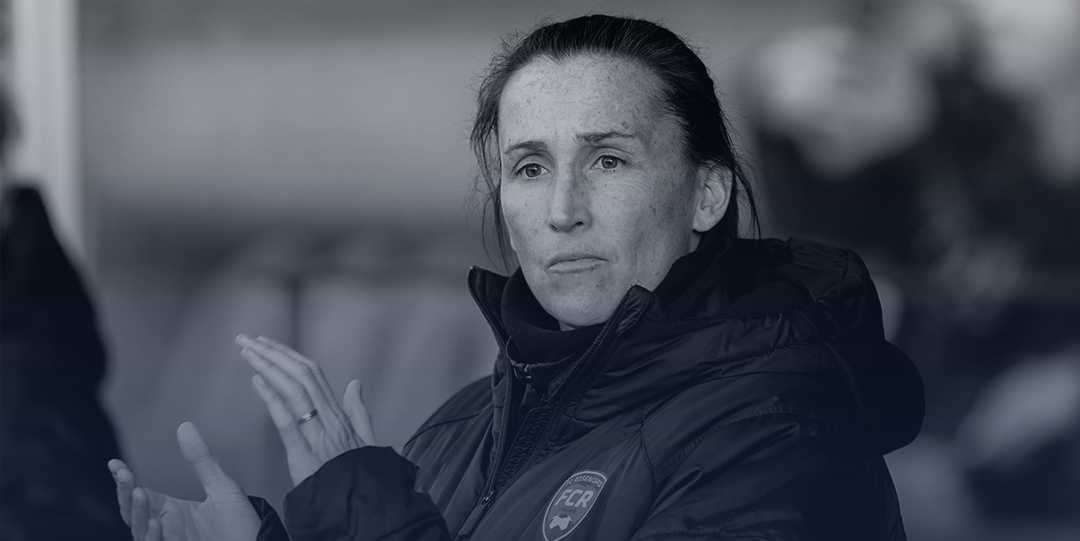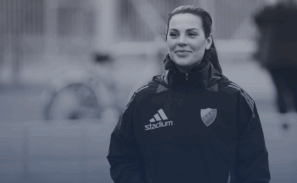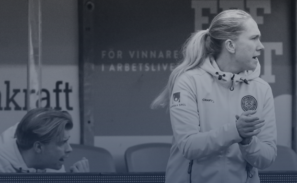She experienced both joy and sorrow during her active career. Today football is still a big part of Shannon Lynn’s life and she enjoys the coaching role she has been given at FC Rosengård.
– Welcoming the challenges and striving to improve are great parts of this job, she says.
Becoming a coach after her active career was never something she really aspired to. Not because others didn’t see her leadership qualities – the problem was more her own doubts.
– To be honest, I really didn’t think I would become a coach and I now know that it was mostly to do with my confidence. Even though I played at a high level, I wondered if I had the capability to pass on my knowledge and experience to other professional goalkeepers, Shannon Lynn says.
She grew up in Canada, played in the USA during her school days, became a Scotland international and represented Chelsea in England before moving to Sweden in 2014. Ten years later, she’s still here, although two years ago she put her active career behind her.
– As I got closer to retirement, I started to get more opportunities to coach, so I thought I should give it a try. Once I started and was working with different levels of goalkeepers, I realized that it was something I really enjoyed. And I was pleasantly surprised that the goalkeepers seemed to respect me as a person and my experience as a goalkeeper.
– After over ten years as a player for the Scotland national team, I was lucky enough to get asked to do some coaching with the Scotland U19 goalkeepers. Then upon my retirement from my playing career, I got the dream opportunity to coach the goalkeepers at FC Rosengård, which is where I am today. I am learning so much every day and I feel incredibly lucky to work with the players and staff here!
While many women find it difficult to combine the desire to become a mother with being a coach at top level, Lynn has had better experiences and is grateful for the support she has received from her club.
– I got a dream job when I was five weeks pregnant. I gave birth to our daughter in July last year and I was lucky enough to feel physically okay during my pregnancy, so I worked until a few days before she was born.
– Now this is where I must give credit to Rosengård as a club, but especially to Therese (Sjögran, sports director for FC Rosengård) for making the process after her birth as smooth as possible. Ofcourse this came with challenges – on my end mostly. I wanted to be two places at once. You know football, no day is the same, and I was really missing it. I went back to work about two months after Kyah was born and the staff and players were fantastic.
Lynn’s wife Sandra, who has played a handful of games for the Swedish national team plays for one of FC Rosengård’s rivals in OBOS Damallsvenskan, Vittsjö GIK. When this ongoing season started the puzzle in schedules was too difficult to make work so Lynn went on maternity leave from February to June.
– As much as I missed my job, that time I got to spend with Kyah was irreplaceable and I am glad I work at a club that understood how important that was, she says.
Last season was a disappointment for FC Rosengård, who missed out on a top four finish for the first time since the current league system was introduced in 1988. This season the club can look back on a spotless performance at the time of writing. Rosengård has won all 18 games, scored 78 goals and conceded just five.
– The season has been exceptional so far for sure and from the outside looking in, wow! But also, from the inside looking at it face on, wow! I give so much credit to Joel (Kjetselberg, coach) and the fantastic work he has done with this group, and of course the rest of the staff and players, who have worked incredibly hard to get back here again, but have also continued to stay humble. We haven’t won anything yet, there is still work to be done and we are ready for it, Lynn says.
What qualities do you consider most important to be a successful coach?
– I think it’s about seeing the person before the player. It’s important to get to know them as people, to learn about them as a whole, while learning about their strengths and things that they can improve as goalkeepers. I think if you spend time doing that, you create an environment that everyone wants to be a part of, which I think will help them to improve and develop in. I want to create an environment that the goalkeepers feel comfortable and supported, while also being challenged.
– I think, especially as a goalkeeper coach that it’s important to take the time to know and understand how the head coach wants us to play, so that you can help develop the goalkeeper to see the whole picture. I think this comes from having a good relationship with the other coaches and building connections between us. I think it’s important to ask questions, be open to learn, and wanting to improve.
What challenges do you usually face in your work as a coach, and how do you deal with them?
– I think a lot of parts of coaching can be challenging, but I think that can also be the great part of this job. Welcoming the challenges and striving to improve. Every player you work with is different, and every game you play is different. The challenge is how you can stick to what you believe in, but also be open to changes in the process.
– It can for sure be a challenge to navigate how to deal with the players who are not playing. Not in a bad way, but I know how difficult that it can be sometimes. So, I think it is really crucial to make every player feel as important and as prepared as you can. Of course, sometimes that can be quite difficult to do, but I think the important thing is to acknowledge all players and be open for constructive conversations. Then it becomes the players responsibility on how they take that in.
What is your goal as a coach?
– My goal is to continue to learn and to grow in this job. I am pretty early in my coaching career so I think it’s important for me to try and take in as much as I can from the great people I am working with.
What is your vision for yourself and for women’s football in general?
– The vision for myself is to hopefully continue to work in football. It’s a short answer but I have a hard time seeing ahead of ’right now’. Of course, my vision is to continue to improve in this field, and hopefully become better at my job. I want to enjoy every moment I can because I know how difficult this job can be.
– As for women’s football, the growth has been pretty amazing the last few years, and I’d like to see it continue to grow. For women to have better opportunities, better finances, more coverage, more publicity, etc, so that this can be a great career for women right now but also for their future.
What needs to be done to bring more women coaches to the elite level?
– I think this is a difficult question, but if I could say something about it, can we try to get more girls and women to start coaching at a younger age? For instance, someone who maybe isn’t going to make it further in their playing career at a high level but has aspirations and a desire to stay in the game. This is where I think we can improve. I’m not quite sure how to do that, but it’s just a thought.
A few years ago, Lynn opened up about how, after losing her partner, she suffered from depression. Looking back on it today, she sees how important football was, how it gave her a safe place in life.
– I say this genuinely that I believe football saved me. When I lost my partner at the age of 22, I really thought that was it for me, that all of my positivity and joy was sucked away. But, when it came to football, that was another love of my life and something that has always been an outlet for me. Therefore, it kept me in routines and kept me from going as far down in the black hole as I could have been.
– I’m not naive to say that I haven’t had some really difficult times in football, but it gave me life, and somehow it could pull me up, at least for a few hours a day back then.












